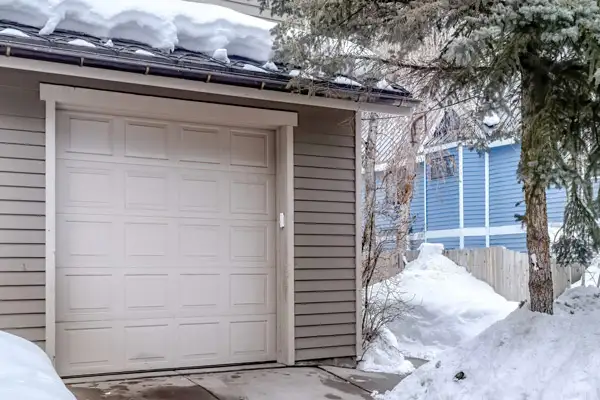A garage door freezing to the floor can be a frustrating and inconvenient problem, especially during cold winter months when moisture and low temperatures combine to create ice buildup. This issue not only makes it difficult to open and close the door but can also cause damage to the door’s weatherstripping and mechanical components over time. Preventing your garage door from freezing to the floor requires proactive steps that address moisture, temperature control, and maintenance. In this guide, you’ll discover easy and effective home tips to keep your garage door free from ice, ensuring smooth operation and protecting your garage space from winter’s harsh effects. Whether you’re dealing with persistent frost or occasional ice patches, these practical solutions will help you maintain a functional, ice-free garage door all season long.
Understanding the Problem of a Frozen Garage Door
A frozen garage door can turn a simple task into an aggravating battle. When temperatures drop, moisture can freeze at the base of your door. This creates a solid bond between the door and the floor.
This issue is particularly common in areas with heavy snowfall or rain followed by frost. The combination of wet surfaces and freezing temperatures sets the stage for trouble.
When you find yourself stuck, it’s not just about inconvenience; there are potential risks to your garage itself. A forceful attempt to open a frozen door might damage components like cables or tracks.
Understanding how this happens empowers you to take preventive measures early on, ensuring that your garage remains functional despite winter’s harsh conditions.
Causes of a Frozen Garage Door
Several factors contribute to a frozen garage door. One primary cause is the accumulation of moisture on the ground beneath the door. When temperatures plummet, this moisture can freeze, creating a solid bond between the door and floor.
Another significant factor is inadequate insulation in your garage. If cold air seeps in through cracks or gaps, it lowers the temperature inside. This chilling effect can lead to frost forming along the edges of your garage door.
Precautionary Measures to Prevent Freezing
To keep your garage door from freezing to the floor, consider applying weather stripping along the bottom edge. This helps create a barrier against moisture and cold air.
Another effective measure is to regularly clean the area around your garage door. Remove any debris, snow, or ice that might accumulate at its base. A clear path can significantly reduce freezing chances.
Installing a heater in your garage can also make a difference. It doesn’t have to be elaborate; even a small space heater can raise temperatures enough to prevent ice buildup.
Ensure proper drainage outside your garage. If water pools near the entrance when it melts, it’s more likely to freeze again as temperatures drop overnight.
Tips for Keeping Your Garage Door from Freezing
To keep your garage door from freezing to the floor, start with proper insulation. Insulating your garage helps maintain a stable temperature, reducing moisture buildup.
Next, consider using a de-icing product on the ground where the door meets it. These products can prevent ice formation without causing damage to your flooring or the environment.
Ensure that your weatherstripping is intact. Cracks and gaps allow cold air in and can lead to condensation, increasing the chance of freezing.
Another simple trick is to keep a space heater in the garage during extremely cold nights. This little boost in warmth may be all you need to prevent freezing.
Regularly clear snow and ice accumulation near your garage door. Keeping this area clean helps minimize moisture exposure and reduces frozen surfaces around your entryway.
Routine Maintenance and Inspections
Routine maintenance is crucial for preventing a frozen garage door. Regular inspections can help you catch potential issues early.
Start by checking the seals and weather stripping around your door. If they’re damaged or worn, cold air can seep in, increasing the risk of freezing.
Lubricate moving parts regularly to ensure smooth operation. This reduces friction and helps prevent ice buildup on hinges and rollers.
Look for any cracks or gaps in your garage floor as well. These areas can collect moisture that freezes during colder months.
It’s also wise to test the door’s balance periodically. An unbalanced door may not seal correctly against the ground, leaving room for water accumulation.
Don’t overlook cleaning tracks and sensors either; dirt can hinder performance when temperatures drop. Keeping everything clean helps maintain efficiency throughout the winter months.
Professional Help and Solutions
When all else fails, seeking professional help can be a game-changer. Experts in garage door services have the right tools and knowledge to tackle stubborn issues.
They can assess the situation quickly, providing solutions tailored to your specific needs. This might include installing insulation or applying specialized anti-freeze treatments that homeowners may not typically consider.
If your garage door frequently freezes, it could indicate underlying problems with drainage or weatherproofing. Professionals will identify these issues and offer long-term fixes rather than quick Band-Aid solutions.
Investing in their expertise ensures your garage remains functional throughout the winter months without unnecessary hassle. Plus, you’ll gain peace of mind knowing everything is handled by someone experienced in the field.
Conclusion
When winter arrives, a frozen garage door can become a frustrating issue. Understanding the problem and its causes is crucial for preventing such inconveniences. By implementing precautionary measures and following simple tips, you can ensure that your garage door remains functional throughout the cold months.
Routine maintenance and inspections play an essential role in keeping your garage door operational. Regular checks on weather seals, lubrication of moving parts, and ensuring proper drainage will go a long way in minimizing freezing issues. If problems persist despite your efforts, don’t hesitate to reach out to professionals who can provide tailored solutions.
Taking these steps not only saves you from frustration but also prolongs the life of your garage door system. With some proactive care, you’ll keep it working smoothly all winter long.




